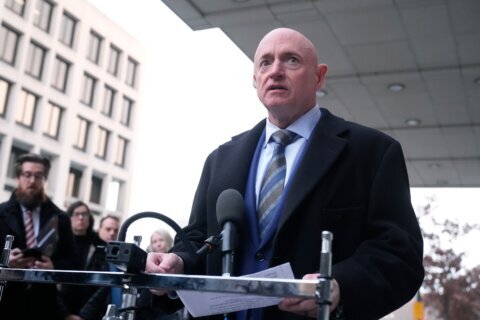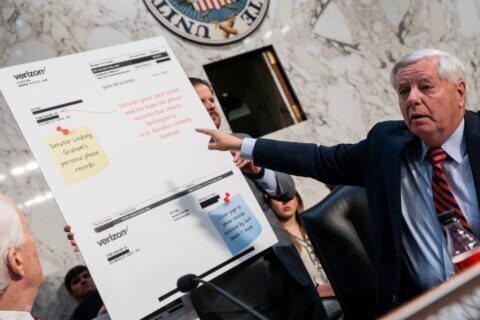A half-century ago Friday, the break-in at the Democratic National Committee offices at the Watergate complex in D.C.’s Foggy Bottom led to an investigation that gripped the country for two years and led to the U.S.’ only presidential resignation. This week, WTOP’s Rick Massimo is talking with experts about how the entire affair has affected American politics, history and even the language ever since.
The first Watergate book most people think about is “All the President’s Men” by Washington Post reporters Carl Bernstein and Bob Woodward, but the actual first book published in the U.S. on Watergate is “The Watergate File,” co-authored by longtime radio journalist Bill Vitka (father to WTOP’s own Will Vitka).
Vitka recently spoke with WTOP about his experience writing the book, as well as the two times he was in the same room as then-president Richard Nixon.
Vitka said publisher Ken Moses picked him because he was covering the story regularly for the rock radio station where he was news director; he enlisted his friends Bruce Buschel and Albert Robbins because the two-month turnaround time (June to Aug. 1973; the book came out that October) would have swamped him.
- ‘Criminal mindset’ — author Garrett Graff on his new history of Watergate
- ‘Still grappling with it’ — 50 years of Watergate on film
- ‘Embracing its history’: Watergate Hotel trades on its claim to fame
- ‘Everything was amazing’ — WTOP’s Capitol Hill team on the Watergate saga
- PHOTOS: Watergate in pictures
- More Watergate Stories
“You needed to keep up with the Watergate hearings to just to have any kind of innocent social interaction. Conversations would start with ‘Did you see the Watergate hearings?’ And most of us watched on PBS late at night, the regurgitation of what happened during the day.”
Specifically, the book filled a niche for those watching along with the hearings: a who’s-who of the people filling America’s TV screens, from Nixon aides to members of Congress. “All the witnesses and the principal players on the other side of the desk — we would identify them; we would outline who they were.”
They were set up in a warehouse in North Philadelphia, where they would go to write chapters and edit each other’s. “I don’t think any of us slept normally for two months,” Vitka remembered.
The Times of London also put out a book on Watergate in Oct. 1973; “In England, their publication date beats us by a day or two. In America, we beat them.”
A double signature
Vitka met Nixon in 1972, just before the election: The president was in Philadelphia for a bill signing; Vitka was reporting. He recalls that Nixon’s events were so managed and his speeches so canned that by the time he’d signed the bill, “Everyone else had left. And I was just curious — I’d never been this close to Richard Nixon before, and I’d lived with Nixon most of my life.”
He edged up to the low stage and saw Nixon looking at him. The president held out his hand, and Vitka took it. After the handshake, Vitka was about to leave when Nixon motioned to him to wait for a moment, and went back to the signing desk to give Vitka a ceremonial signing pen with the president’s autograph printed on the box.
A few weeks later, Vitka was covering a campaign event with Sen. George McGovern, Nixon’s Democratic opponent. At the end, he asked McGovern to autograph the box next.
“And he obliged,” Vitka said. “He smiled when he signed it.”
The other time Vitka was in the same room with Nixon was at one of the inaugural balls in Jan. 1973: “We got tuxedos, which, by the way, was really foreign dress (for us) at the time.”
He described the ball as “like watching a Lawrence Welk episode on TV,” complete with remarks from Nixon on what he described as “a glorious day for Republicanism.”
“We thought we were being followed,” Vitka remembered, because even with the tuxedos, “we looked a little unkempt for, you know, a Republican inaugural ball.”
The fact that he and his photographer had been tear-gassed at an anti-Vietnam War protest the previous day probably didn’t help.
“It’s all part of that strange, vivid memory that’s — I guess it (takes) about 30 seconds in the classroom these days — known as the ’60s,” Vitka said.
And, as every interview subject this week has, Vitka compared the Watergate saga to the Jan. 6 hearings currently playing out on TVs across the country.
“Frankly, democracy is at stake, right?,” Vitka said. “I mean, it’s amazing that more people don’t feel this in their gut. But they don’t.”
Justice
While Vitka remains proud of the book — to this day, he says, “I think the book is accurate,” and is proud it was dedicated to security guard Frank Wills, whose sharp eye detected the break-in that eventually ended the Nixon presidency. But the rest of the story of “The Watergate Files” doesn’t end that well.
The “publisher” turned out to be not a publisher but an agent, Vitka said; once the manuscript was finished, it still had to be sold to an actual publisher. The three authors were given $150 in seed money, “and that’s all the money I received from the book.”
One day, Vitka was driving with his co-authors down 34th Street in Philadelphia when they saw their agent walking by. “Albert jumped out of the window. Half of him was out; Bruce held him back. He was leaping out of the car to kill Ken Moses. … I guess it’s as close to justice as we ever got.”








